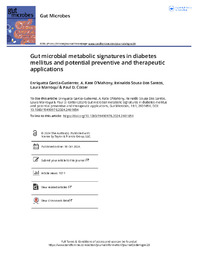Por favor, use este identificador para citar o enlazar este ítem:
https://hdl.handle.net/11000/38551Registro completo de metadatos
| Campo DC | Valor | Lengua/Idioma |
|---|---|---|
| dc.contributor.author | Garcia-Gutierrez, Enriqueta | - |
| dc.contributor.author | O'Mahony, A. Kate | - |
| dc.contributor.author | dos Santos, Reinaldo S. | - |
| dc.contributor.author | Marroqui Esclapez, Laura | - |
| dc.contributor.author | Cotter, Paul | - |
| dc.contributor.other | Departamentos de la UMH::Fisiología | es_ES |
| dc.date.accessioned | 2025-11-27T13:20:50Z | - |
| dc.date.available | 2025-11-27T13:20:50Z | - |
| dc.date.created | 2024 | - |
| dc.identifier.citation | Gut Microbes | es_ES |
| dc.identifier.issn | 1949-0984 | - |
| dc.identifier.issn | 1949-0976 | - |
| dc.identifier.uri | https://hdl.handle.net/11000/38551 | - |
| dc.description.abstract | Diabetes mellitus can be subdivided into several categories based on origin and clinical characteristics. The most common forms of diabetes are type 1 (T1D), type 2 diabetes (T2D) and gestational diabetes mellitus (GDM). T1D and T2D are chronic diseases affecting around 537 million adults worldwide and it is projected that these numbers will increase by 12% over the next two decades, while GDM affects up to 30% of women during pregnancy, depending on diagnosis methods. These forms of diabetes have varied origins: T1D is an autoimmune disease, while T2D is commonly associated with, but not limited to, certain lifestyle patterns and GDM can result of a combination of genetic predisposition and pregnancy factors. Despite some pathogenic differences among these forms of diabetes, there are some common markers associated with their development. For instance, gut barrier impairment and inflammation associated with an unbalanced gut microbiota and their metabolites may be common factors in diabetes development and progression. Here, we summarize the microbial signatures that have been linked to diabetes, how they are connected to diet and, ultimately, the impact on metabolite profiles resulting from host-gut microbiota-diet interactions. Additionally, we summarize recent advances relating to promising preventive and therapeutic interventions focusing on the targeted modulation of the gut microbiota to alleviate T1D, T2D and GDM. | es_ES |
| dc.format | application/pdf | es_ES |
| dc.format.extent | 36 | es_ES |
| dc.language.iso | eng | es_ES |
| dc.publisher | Taylor and Francis | es_ES |
| dc.relation.ispartofseries | 16 | es_ES |
| dc.rights | info:eu-repo/semantics/openAccess | es_ES |
| dc.rights | Attribution-NonCommercial-NoDerivatives 4.0 Internacional | * |
| dc.rights.uri | http://creativecommons.org/licenses/by-nc-nd/4.0/ | * |
| dc.subject | Type 1 diabetes | es_ES |
| dc.subject | Type 2 diabetes | es_ES |
| dc.subject | Gestational diabetes | es_ES |
| dc.subject | Gut microbiota | es_ES |
| dc.subject | Gut barrier | es_ES |
| dc.subject | Gut dysbiosis | es_ES |
| dc.subject | Shortchain fatty acid | es_ES |
| dc.subject | Probiotic | es_ES |
| dc.subject | Fermented foods | es_ES |
| dc.subject.other | CDU::6 - Ciencias aplicadas::61 - Medicina::612 - Fisiología | es_ES |
| dc.title | Gut microbial metabolic signatures in diabetes mellitus and potential preventive and therapeutic applications | es_ES |
| dc.type | info:eu-repo/semantics/article | es_ES |
| dc.relation.publisherversion | https://doi.org/10.1080/19490976.2024.2401654 | es_ES |

Ver/Abrir:
5_2024_Gut microbial metabolic signatures in diabetes mellitus and potential preventive and therapeutic applications.pdf
3,18 MB
Adobe PDF
Compartir:
 La licencia se describe como: Atribución-NonComercial-NoDerivada 4.0 Internacional.
La licencia se describe como: Atribución-NonComercial-NoDerivada 4.0 Internacional.
.png)